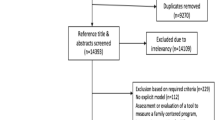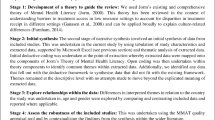Abstract
This qualitative study describes how the restrictions imposed by the COVID-19 pandemic impacted on Machado-Joseph disease (MJD) patients and their care, in the island of São Miguel (the Azores, Portugal). In-person semi-structured interviews were conducted with 11 participants, including patients, family members, healthcare professionals, and care providers. Main findings highlighted the key role played by the local association in psychosocial and healthcare for MJD patients and families, and the adverse effects on their care following the onset of the COVID-19 pandemic. In particular, hindered access to the day-care centre increased isolation and had a negative impact on mental health and disease progression. For persons with a progressive and severe neurological disease, there is no “back to normal.” Future restrictive measures ensuing need to be accompanied by a careful definition of daily care routines for patients.
Similar content being viewed by others
Avoid common mistakes on your manuscript.
Introduction
The COVID-19 pandemic exacerbated existing difficulties and created extra hazards for rare disease patients (EURORDIS 2020). Machado-Joseph disease (MJD/SCA3) is a rare, autosomal dominant, progressive, highly incapacitating, late-onset neurological disease (mean age-at-onset: ~ 40 years), and is the most frequent dominant ataxia worldwide (Sequeiros et al. 2012). MJD prevalence in Portugal is 3.1:100,000 (Coutinho et al. 2013), with clusters in the Azores islands: 835.2 in Flores and 27.1 in São Miguel (de Araújo et al. 2016), the highest rate worldwide. The experience of living with MJD in the community has been assessed in a mainland cluster (Paúl et al. 1999), but not in the Azores. MJD patients experience increased psychological distress as the disease progresses (Gonzalez et al. 2012). No studies have reported so far how the COVID-19 pandemic impacted the MJD communities; our purpose is to contribute to fill-in this gap and describe how restrictions imposed by this pandemic affected the care provided to MJD families, in São Miguel.
Methods
This qualitative exploratory study draws on empirical data from a larger study on experiences surrounding MJD in São Miguel, from the perspective of patients, relatives, healthcare professionals (HCPs), and care providers. We present the sub-corpus of data focusing on the impact of the COVID-19 pandemic, a theme that emerged during that analysis.
Following ethics approval (i3S-CECRI-22/2021), the study was presented to the Azorean MJD patients’ association (AAADMJ, www.aaadmj.com), which circulated information among users, staff, and HCPs; AAADMJ has the only specialised community facility in the country for MJD patients. Participants stated their interest to the main researcher (DC) and provided written informed consent; snowball sampling complemented recruitment. Inclusion criteria were as follows: adults competent to provide consent; living in São Miguel; with personal, family, or professional experiences related to MJD. Data specific to the COVID-19 pandemic involved 11 participants (8 female), out of 28, collected January–March 2022, through semi-structured in-person interviews: six MJD patients, one family member, two HCPs, and two day-care workers (range: 30–54 years).
All interviews were conducted by DC, fully complied with the sanitary measures required by the Regional Secretary of Health, and were audiotaped after authorisation (range: 8–43 min). Collection ceased after data saturation. Interviews were transcribed verbatim in Portuguese; participants’ quotes selected were translated into English. Data were analysed thematically (Braun and Clarke 2006): DC read repeatedly all transcripts and created a first coding system of (sub)themes; LS and ÁM read a subsample of transcripts that were iteratively discussed and refined emerging codes and (sub)themes. The theme “restrictions in care following the COVID-19 pandemic” is presented here. The following codes are used: P, patient; R, relative; H, healthcare professional; D, day-care worker.
Results
Participants described the negative impact the pandemic had in their care, especially the restricted functioning of the day-care centre, closed for 3 months following the first lockdown (March 2020), though its staff made their best to stay in-touch remotely with users:
Everyone was isolated, and we kept contact with patients through video-call. [D7]
We work online a lot (…). We were able to reach patients, either by phone or video-call. [H1]
Nevertheless, lockdowns made patients feel “shut” at home; the first lockdown was particularly difficult due to its unexpectedness: “the first days were very hard” [P5]. One family member acknowledged the importance of the day-care centre: “we had to stay home and believe me, I really missed the centre. I feel a lot of support from them” [R1].
Lack of social interaction, leisure activities, and physical stimulation were of great concern, impacting on disease progression:
Outdoor activities, like lunches, picnics, didn’t happened in the last two years. I noticed a big difference in symptoms, some worsened a lot. [D6]
We see a big difference in disease progression. With less stimulation [patients] are more monotonous, stayed more at home, and for them it was brutal. [H1]
Limited access to the day-care centre made patients feel more isolated:
It was like staying at home weeks and weeks in a row; it was hard. At the association, I had more things to do, it is much better. [P14]
I’m always in bed (…). My wife must leave to work, and I stay alone [P16].
HCPs and day-care workers also reported a negative impact on patients’ wellbeing and mental health:
I think they are more anxious and depressed. I feel they are more closed off, which makes them even more dependent. [H2]
Many of them sank. They lost weight, got weaker, and sadder. When we got back, they were down, further weakened. [D7]
The day-care centre adapted its routines to accommodate public-health recommendations:
We organised patients into two smaller groups, so that less people come each time, to avoid outbreaks. They are now coming only once-a-week, they used to come twice-a-week and groups were larger. [D7]
Discussion
These findings show the conflation of increased risks and needs ensuing from the pandemic, for the MJD community in São Miguel. It emphasises the restrictions to social and healthcare services, and the centrality of the community-based care facilities. Without the support of these services, patients live in the shadow of inertia and social isolation, with detrimental effects for disease progression and mental health. Being confined at home was a common experience before attending the day-care centre, even without COVID-19 restrictions, as it is for those who are not supported by the day-care centre. For instance, patients and families with Huntington’s disease (HD) were found to be able to cope with the limitations of COVID-19 using previously adaptive solutions, related to be “confined” at home (Solito et al. 2021). In São Miguel, patients were now returning to the day-care centre; however, some detrimental effects were irreversible. Our findings suggest that any restrictions imposed by potential future outbreaks must be accompanied by effective support. Helping patients developing a day-by-day routine, which reduces isolation, and promoting adequate wellbeing and mental health is crucial (Halley et al. 2021).
Limitations of this study were its small data-corpus, heterogeneous study-population from a single recruitment site. Conclusions may not apply to other populations (including in other Azorean islands and the mainland), nor to similar diseases. The study shows how restrictions to care imposed by the COVID-19 pandemic affected (holistically) MJD patients. Institutions should work with HCPs and patient-advocacy groups to assess patients and families’ needs, in order to design, develop, and pilot interventions that support all MJD communities in challenging times.
References
Braun V, Clarke V (2006) Using thematic analysis in psychology. Qual Res Psychol 3(2):77–101. https://doi.org/10.1191/1478088706qp063oa
Coutinho P, Ruano L, Loureiro JL et al (2013) Hereditary ataxia and spastic paraplegia in Portugal: a population-based prevalence study. JAMA Neurol 70:746–575. https://doi.org/10.1001/jamaneurol.2013.1707
de Araújo M, Raposo M, Kazachkova N, Vasconcelos J, Kay T, Lima M (2016) Trends in the epidemiology of spinocerebellar ataxia type 3/Machado-Joseph disease in the Azores Islands. Portugal JSM Brain Sci 1(1):1001
EURORDIS (2020) https://www.eurordis.org/publication/how-has-covid-19-impacted-people-rare-diseases-0. Accessed 6 Apr 2022
Gonzalez C, Gomes E, Kazachkova N et al (2012) Psychological well-being and family satisfaction levels five years after being confirmed as a carrier of the Machado-Joseph disease mutation. Genet Test Mol Biomark 16:1–6. https://doi.org/10.1089/gtmb.2011.0370
Halley MC, Stanley T, Maturi J et al (2021) “It seems like COVID-19 now is the only disease present on Earth”: living with a rare or undiagnosed disease during the COVID-19 pandemic. Genet Med 23:837–844. https://doi.org/10.1038/s41436-020-01069-7
Paúl C, Martín I, Silva MR, Silva M, Coutinho P, Sequeiros J (1999) Living with Machado-Joseph disease (MJD) in a small rural community of the Tagus valley. Community Genet 2:190–195. https://doi.org/10.1159/000016211
Sequeiros J, Martins S, Silveira I (2012) Epidemiology and population genetics of degenerative ataxias In: Subramony SH, Durr A (eds): Ataxic Disorders. Handb Clin Neurol 103 227–251. Elsevier, Edinburgh
Solito M, Petracca M, Zinzi P, Bentivoglio AR, Lo Monaco MR (2021) Huntington’s disease patients and families facing COVID-19 emergency in Italy. J Neurol Neuros Psychiat 92(Suppl 1):A37. https://doi.org/10.1136/jnnp-2021-EHDN.87
Acknowledgements
The authors thank all participants and the AAADMJ, for their help in recruitment. A special credit to all its staff, in particular Dr. Ana Pedro and Dr. Carlos Baptista for their hospitality and continuous support.
Funding
Álvaro Mendes is supported by the FCT — the Portuguese Foundation for Science and Technology (CEECIND/02615/2017). This work is also supported by FEDER, funded by the Programa Operacional Competitividade e Internacionalização — COMPETE2020 and by national funds through FCT (POCI-01–0145-FEDER-007274) in the framework of the project “Instituto de Investigação e Inovação em Saúde” and from GenomePT (POCI-01–0145-FEDER-022184).
Author information
Authors and Affiliations
Contributions
ÁM and LS designed the study. DC was responsible for the data collection, and DC, ÁM, and LS contributed to the analysis and interpretation of data. DC and ÁM drafted the manuscript, and LS, JS, and ML revised it critically and gave final approval of the submitted manuscript.
Corresponding author
Ethics declarations
Competing interests
The authors declare no competing interests.
Conflict of interest
The authors declare no competing interests.
Additional information
Publisher's note
Springer Nature remains neutral with regard to jurisdictional claims in published maps and institutional affiliations.
Rights and permissions
About this article
Cite this article
Couto, D., Sousa, L., Sequeiros, J. et al. Short Communication: Restrictions in care following the COVID-19 pandemic severely impacted Machado-Joseph disease patients: a study in the Azores Islands, Portugal. J Community Genet 13, 459–461 (2022). https://doi.org/10.1007/s12687-022-00602-2
Received:
Accepted:
Published:
Issue Date:
DOI: https://doi.org/10.1007/s12687-022-00602-2




